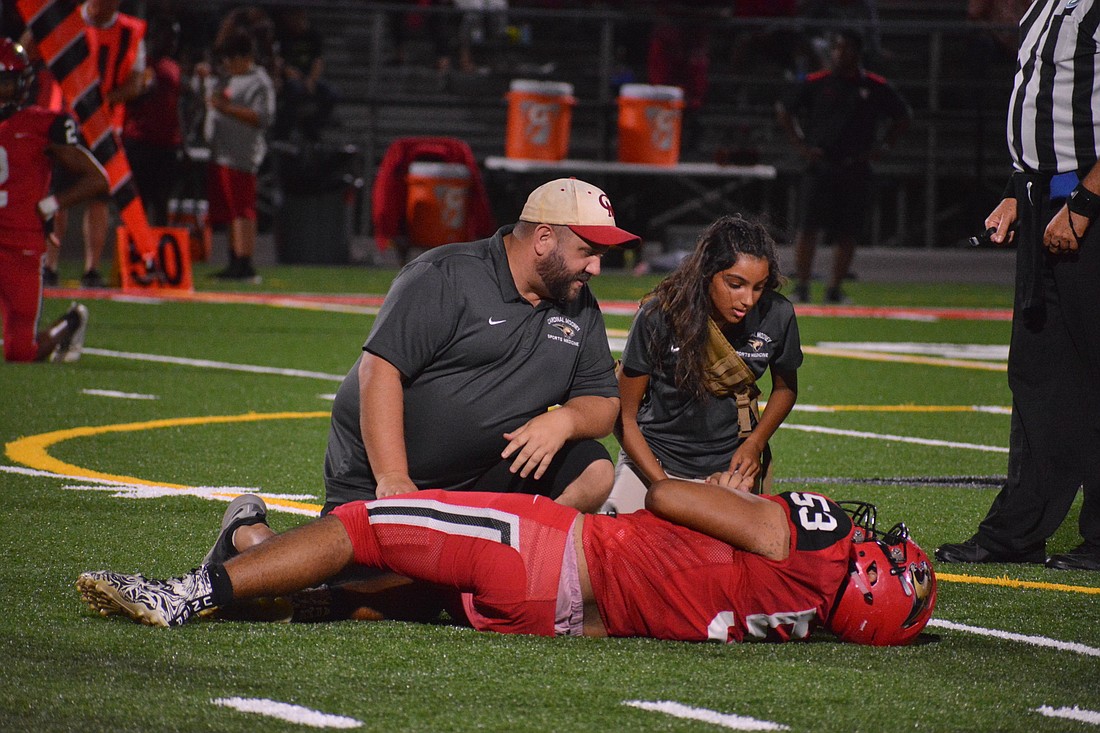- January 15, 2025
-
-
Loading

Loading

Mikayla Owen had no idea what she was walking into when she accepted an athletic training job with Manatee County this year.
Fresh out of graduate school at the University of South Florida, which included training stints with USF Athletics and the Pittsburgh Pirates, the 24-year-old was assigned to Braden River High, where she is now the school’s lone athletic trainer. Things at this level are more hectic than she anticipated, but she said she wouldn’t trade it for anything. Turns out, she was walking into a family.
“The relationship-building is the best part,” Owen said. “Communicating with the athletes and having them trust me with their injuries while being able to joke around with them. I feel like the mother of 600 [kids].”
Every day, Owen and her nine student helpers — who receive extracurricular credit for their time and have to help after school at least three times a week if they want to work during football games — take care of Pirates athletes. Afternoons are hectic. On average, upwards of 30 athletes from all sports fill the training room at the moment the end-of-day bell rings and require anything from taped ankles to “cupping” therapy on their backs to relieve pain. Owen is qualified to do it all, even helping kids go through physical therapy for more long-term injuries. Her student trainers can’t do all that, legally, but they help with filling water containers and placing bandages on kids who receive cuts. They also act as an extension of Owen’s eyes, she said, and call her if they see someone in need of assistance. Owen said she couldn’t do the job without them.
Despite her expertise, the transition to high school hasn’t been the easiest thing for Owen. At first, she said, a handful of athletes didn't show her respect because she is a woman; they would talk down to her and ignore her advice. (Braden River’s previous athletic trainer was male.) The interactions caused her to report the action to the athlete’s coaches, something she said she isn’t entirely comfortable doing, but since doing so, the interactions between her and those athletes has been better.
With everyone else, it has always been great. Owen has a speaker in the training room for students to play their favorite music. She wants them to be at ease, she said. When everyone else is having fun, Owen is having fun. She never knows what will come through the training room door — or happen during a game — on a given day. That sense of the unknown keeps things fresh, she said.
“I could have gone into physical therapy to make more money," she said. "My degree is in exercise science, so I could have done either. But I didn’t want to be in an office all day. That’s not me. I would have been bored. I would rather be doing something I love. Every day is something new.”
Over at Sarasota’s Cardinal Mooney High, athletic trainer Steven Favia, who works directly for the private school, has been doing this since 2012. For the first five years, it was more or less a solo gig, outside of wrangling people out of the stands to fill water bottles at big events. Last year he had the idea to add student trainers on a volunteer basis. It went so well that this year, Favia and the school turned it into a full-fledged class. Favia and his 14 students meet at 2:30 every day and go over a given topic, which is sometimes a refresher and sometimes brand new. There are levels to the class, which act like security agencies’ clearance levels: The more you know, the more you can do. Students gradually climb levels when they demonstrate mastery of the material, either on or off the field, Favia said.
Cougars senior Tiffany Thomas has been with the program since 2018. Thomas said she has learned a lot since then, most recently how to take off a football player’s helmet without moving their head or neck — plus the importance of doing so — and how to apply CPR. The training goes beyond medical basics, and it is working: On Sept. 19, Favia’s students made the call to cancel football practice because they saw lightning strikes too close to the field on the school’s monitoring equipment, located in the training room. The football coaches listened to them.
Favia didn’t know what to expect when he started the program, but it has turned into something he talks about with pride. Taking the bus to an away game with his 14 students singing Justin Bieber songs around him: It’s something he thought he would hate, he said, but he loves it, and his students love him.
“Steve gives us his all every day,” Thomas said. “He’s so fun. He’s almost like a second dad. If you are having a bad day, this [program] will turn it into a good day.”
Favia said he wants his students getting as much real-world experience as possible. The seniors in his class will soon take a trip to observe a surgery in progress and report back to the class on what the specific injury was, what the rehab process will be like and how to prevent those injuries in the future, among other things.
It’s not the easiest class, and Favia is still learning how to be a teacher (grading is the worst part of it, he said), but he made sure to instill the biggest lesson he learned himself early and often.
“If [the athletes] know you love them, they will love you back,” Favia said.